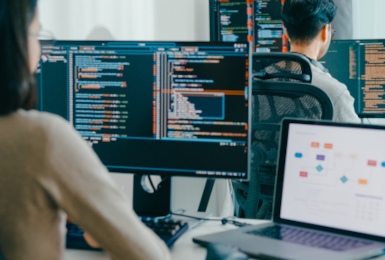Combining the tradition and practice of law with the advanced technology of the digital era, computer forensics plays a pivotal part in today's society. Those who specialize in computer forensics actively work to collect and harvest digital data during criminal investigations that may be used in court — allowing them the chance to play a key role in upholding the integrity of the justice system.
What Is Computer Forensics?
Computer forensics is defined by IBM as a scientific field that combines computer science, criminal justice, and forensics in order to collect digital evidence and prepare it in a way that is admissible in court. The industry first gained prominence in the late 1980s when the digital revolution began to take hold and more transactions were conducted on computerized machines. Then, computer forensics expanded rapidly in the past few decades, as the rise of cloud computing and mobile technology ensured that nearly all business was completed online.
How Is Computer Forensics Used?
At the time that computer forensics first emerged as a scientific field, most professionals simply worked to collect evidence on computers and other solitary digital devices. However, as technology quickly evolved and society became more dependent on internet-connected devices, computer forensic experts had to adapt.
Today, digital forensics experts collect evidence from traditional digital devices like computers, but they also have to extract evidence from the smart devices that power the modern world — such as automobiles, appliances, security systems, and more. Essentially, any device with a database can be used as part of a computer forensics investigation.
Computer forensics primarily comes into play when:
Solving Cybercrimes and Legal Cases
When cybercrimes occur, law enforcement officers and investigators often enlist the help of computer forensics experts. Combining their knowledge of the legal landscape with their advanced understanding of computer science, computer forensics specialists are able to extract digital evidence from technological devices and ensure it is presentable in court. The work digital forensics experts do each day ensures that cybersecurity measures are effectively implemented and improved — and that people who are responsible for destructive cybercrimes are brought to justice.
Protecting Organizations From Data Breaches
In addition to mitigating cybercrime and assisting with digital investigations, computer forensics specialists work proactively with organizations to enhance their cybersecurity. Some digital forensics professionals evaluate and analyze previous incidents within an organization as well as assess the current computer infrastructure to determine if any steps should be taken to prevent data breaches from occurring in the future.
Computer Forensics vs. Cybersecurity
While computer forensics and cybersecurity are closely related, there are essential distinctions to be aware of. These are some differences between cybersecurity and computer forensics to know:
- Cybersecurity professionals are primarily responsible for creating digital infrastructure that protects data and prevents cybercrime. They are more likely to focus on prevention efforts rather than mitigation efforts.
- Computer forensics professionals respond to cybercrime allegations and extract digital evidence that may be needed as part of the court proceedings. They are more likely to respond to incidents rather than prevent them.
- Cybersecurity professionals who mitigate cyberattacks actively work to halt the attack and prevent further damage from occurring. Computer forensics specialists who respond to cybercrime allegations collect the evidence required to identify the culprit of the crime.
Despite the key differences between these two fields, there also exists plenty of overlap. Cybersecurity professionals and digital forensics experts commonly collaborate in order to protect the integrity of an organization's network and ensure that cybercriminals are brought to justice.
The Computer Forensics Process
Though the approach to each digital investigation differs based on a variety of factors, the computer forensics process can be broken down into four key steps. The following sections outline the computer forensics process:
Identification and Collection of Evidence
The first two steps in the computer forensics process are identification and evidence collection.
- Identification requires a computer forensics professional to identify the device or network that’s involved in the cybercrime and determine which type of data needs to be extracted from those devices. Identified devices are typically collected and removed from the premises, then stored in a secure facility so that data can be recovered in a way that is admissible in court.
- Evidence collection requires the computer forensics professional to carefully and securely extract data that may be relevant to the crime and need to be used during the court proceedings. In addition to collecting the data, computer forensics work to carefully preserve a copy of the data — as some digital data can easily be lost, destroyed, or manipulated.
Analysis and Examination
The final two stages of the computer forensics process entail analysis and examination.
- Forensic analysis must be performed by computer forensics experts in order to identify the most relevant data to the investigation. For example, during the forensic analysis process, a computer forensics expert may be able to uncover deleted e-mails or text messages. Digital forensics experts use highly specialized and advanced techniques to unveil hidden data that may be useful.
- Once an investigation is complete, computer forensics experts examine the relevant data and create a report to present their findings. The report typically includes relevant findings, analysis, contextual information, and recommended next steps. In most cases, the report is what is presented to the court during the legal proceedings.
Tools and Techniques in Computer Forensics
Given that computer forensics combines the technological advancements of computer science with the precision of the legal realm, it makes sense that computer forensics specialists have the opportunity to work with specialized tools and apply advanced techniques to conduct their daily tasks. Explore some commonly used tools and techniques in digital forensics:
Forensic Software and Hardware Tools
Computer forensics experts must become proficient with advanced forensic software and hardware tools in the field. The most frequently used digital forensics software and hardware tools include:
- Autopsy, known for its user-friendly interface and wide range of capabilities.
- Sleuthkit, an open-source toolkit designed to operate on a variety of platforms, making it one of the most versatile forensic tools available.
- ProDiscover, a software program designed to assist with the analysis of digital evidence collected as part of a computer forensics investigation.
Data Recovery and Malware Analysis
Computer forensics specialists often have to recover hidden data, which means they rely on advanced data recovery and malware analysis tools. These allow computer forensic experts to easily acquire data and preserve it while also identifying malware. Such tools play a central role in preserving the integrity of the data and ensuring that digital forensics experts are able to extract the relevant data required for the investigation.
Skills Needed for a Career in Computer Forensics
Those interested in pursuing a career in computer forensics will want to focus on developing the practical, technical, and soft skills required for this field. These are the top skills needed for a career in computer forensics:
- Technical aptitude – Computer forensics professionals should be comfortable and familiar with a wide range of technology, with the ability to navigate advanced digital tools.
- Legal knowledge – To assist with investigations and prepare documents for legal proceedings, computer forensics professionals need to possess a solid base of legal knowledge.
- Cybersecurity skills – Computer forensics professionals require advanced cybersecurity skills in order to extract and preserve data.
- Soft skills – Competencies like communication, collaboration, and problem-solving are crucial when working in a computer forensics career.
Potential Careers in Computer Forensics
The need for skilled and experienced computer forensics professionals is on the rise. According to the United States Bureau of Labor Statistics (BLS), employment for forensic science technicians and digital forensics experts is expected to increase by about 14% between 2023 and 2033 — much faster than average when compared to all other occupations. Those who earn a computer forensics bachelor's degree can find a wide range of potential career opportunities in computer forensics available, such as:
- Computer crime investigator – This type of forensic investigator and law enforcement professional specifically focuses on cybercrime. They are responsible for collecting evidence related to cybercrime investigations, and they must be able to properly and securely store that evidence for the purpose of court.
- Digital forensics analyst – A digital forensics analyst is responsible for investigating computer security incidents and cybercrime activity in order to uncover vulnerabilities and develop strategies that will prevent further incidents from occurring in the future.
- Forensic examiner – A forensic examiner is often responsible for analyzing evidence related to a crime to provide context during criminal proceedings in court. While some forensic examiners evaluate and examine physical evidence, certain specialized examiners work exclusively with digital evidence.
- Cybercrime specialist – Sometimes referred to as a cybercrime investigator, a cybercrime specialist works to investigate and analyze cybercrimes. Some of the most common cybercrimes that cybercrime specialists investigate include hacking and online fraud.
- Incident response analyst – An incident response analyst is a digital forensics expert who reviews and analyzes the response to cybercrime incidents and provides context for how an organization can improve processes and prevent similar incidents in the future. They provide insight into how responses to these types of incidents can be improved in the future.
Education for a Career in Computer Forensics
Choosing a relevant and specific undergraduate degree program is an ideal first step to take toward beginning your computer forensics career. At Champlain College Online, we offer an online bachelor’s degree in computer forensics and digital investigations. This program covers the foundational knowledge required for this growing field and enables you to develop the skill set to pursue potential certifications that can enhance your expertise (such as the Certified Computer Examiner or GIAC Certified Forensic Analyst certification programs).
What Is Computer Forensics? Learn More at Champlain College Online
Digital evidence plays a prominent role in all kinds of criminal investigations — underscoring the importance of having skilled and qualified digital forensics experts on hand. At Champlain College Online, we offer an online Bachelor of Science in Computer Forensics & Digital Investigations degree program that equips students with a solid foundation in computer science, plus the investigation skills required to properly collect and prepare digital evidence that is admissible in court. This field is ever-expanding, allowing graduates to take advantage of a strong and diverse job market.
Request more information about our online degree programs today.
Request Information
Connect with our admissions team to learn more about Champlain College Online today.

Request Information
I acknowledge that, by clicking the "submit" button, I am giving my express written consent to Champlain College and its representatives to contact me about educational opportunities via email, text, or phone, at the phone number above, including my mobile phone, using an automatic dialer, or pre-recorded message. Message and data rates may apply. I understand that my consent is not a requirement for enrollment, and I may withdraw my consent at any time.






